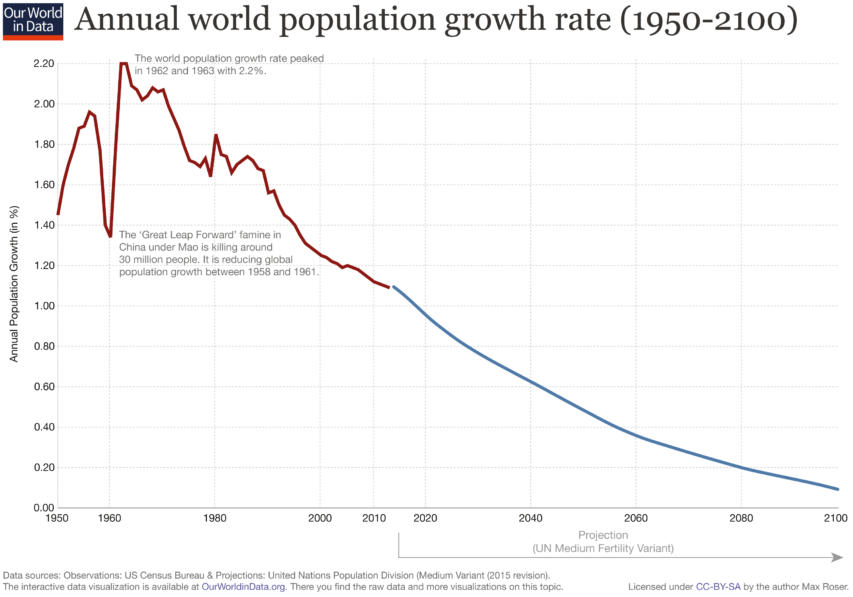Barry Brownstein looks at some of the claims from Malthus onward about the imminent demise of humanity due to overpopulation and how that same concern keeps popping up again and again:
… James Lovelock advanced the Gaia hypothesis that Earth is one “self-regulating organism.” Lovelock forecasts the population of the Earth will fall to one billion from its current total of over seven billion people. Given Lovelock’s cheerfulness about such carnage, it is easy to see why Alan Hall, a senior analyst at The Socionomist, wonders whether “today’s drives to limit consumption and population” are ideologically related to the eugenics movement from the past century. In his essay “A Socionomic Study of Eugenics,” Hall writes in The Socionomist:
Circa 1900, influential intellectuals in Europe and the U.S. voiced concerns about uncontrolled procreation causing a supposed decline in the quality of human beings. Today, similar groups voice concerns about uncontrolled population growth and resource consumption causing a decline in the quality of the environment … Today’s green advocates brandish images of an overrun, dying planet.
Today, the Bill and Melinda Gates Foundation is working to aid the lives of children living “in extreme poverty.” In his book, Factfulness, the late professor of international health Hans Rosling, reports on critics of the Gates Foundation who reject such efforts. “The argument goes like this,” Rosling writes. “If you keep saving poor children, you’ll kill the planet by causing overpopulation.”
In the face of advocates for such beliefs, no wonder Hall asks us to reflect on whether we “will make the cut” if those seeking to cull humanity are successful.
Malthusian Doom
We’ve all heard the SparkNotes version of Malthusian predictions of doom caused by overpopulation. Malthus thought food production could not keep pace with population growth. In his 1798 “Essay on the Principle of Population,” Malthus anticipated the suffering that awaited humanity.
The power of population is so superior to the power in the earth to produce subsistence for man, that premature death must in some shape or other visit the human race. The vices of mankind are active and able ministers of depopulation. They are the precursors in the great army of destruction; and often finish the dreadful work themselves. But should they fail in this war of extermination, sickly seasons, epidemics, pestilence, and plague, advance in terrific array, and sweep off their thousands and ten thousands. Should success be still incomplete, gigantic inevitable famine stalks in the rear, and with one mighty blow levels the population with the food of the world.
Unlike Ehrlich and others, Malthus had reason to be a pessimist in his lifetime. If Malthus had been writing history or predicting the near future, he would not have been far from the mark.
Many of the predictions of overpopulation were based on estimates of population growth (especially in sub-Saharan Africa) which were far from accurate, and in every case we know of, increased economic well-being directly impacts population growth so as a country begins to get richer its population growth begins to slow down significantly (most first-world nations are already at or below population-replacement birthrates).
In their book, Empty Planet: The Shock of Global Population Decline, Darrell Bricker and John Ibbitson have startling facts for those who believe the population will continue to explode.
No, we are not going to keep adding bodies until the world is groaning at the weight of eleven billion of us and more; nine billion is probably closer to the truth, before the population starts to decline. No, fertility rates are not astronomically high in developing countries; many of them are at or below replacement rate. No, Africa is not a chronically impoverished continent doomed to forever grow its population while lacking the resources to sustain it; the continent is dynamic, its economies are in flux, and birth rates are falling rapidly. No, African Americans and Latino Americans are not overwhelming white America with their higher fertility rates. The fertility rates of all three groups have essentially converged.
Looking at current trends and expecting them to continue is what Hans Rosling calls “the straight line instinct.” That instinct often leads to false conclusions.





